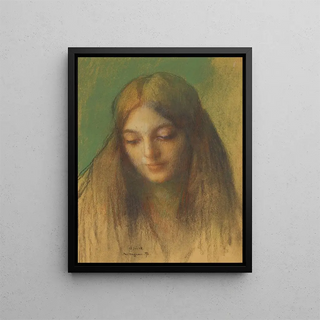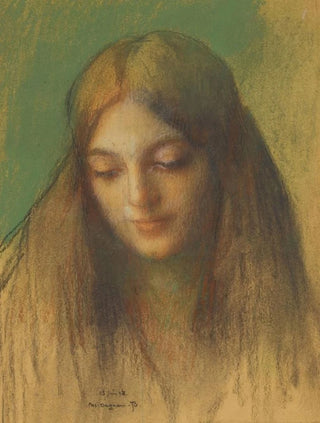Art print | Study of Madonna for the Comforter of the Afflicted - Pascal-Adolphe-Jean Dagnan-Bouveret


View from behind

Frame (optional)
In the rich and complex universe of art history, certain works stand out for their ability to evoke deep emotions and intense reflections. The art print Study of Madonna for the Comforter of the Afflicted - Pascal-Adolphe-Jean Dagnan-Bouveret is a perfect example. This piece, imbued with spirituality and sensitivity, transports us to a world where beauty and pain coexist. Dagnan-Bouveret, a French artist of the 19th century, manages to capture the very essence of compassion through the face of the Madonna, an iconic figure of motherhood and unconditional love. By immersing ourselves in this study, we are invited to explore universal themes of suffering and redemption, while admiring the artist's technical virtuosity.
Style and uniqueness of the work
The work is distinguished by its realistic style, characteristic of the naturalist movement that marked the late 19th century. Dagnan-Bouveret, a true master of detail, manages to breathe palpable life into his characters. The Madonna, at the center of the composition, is depicted with a softness and delicacy that highlight her protective nature. The interplay of light and shadow, skillfully orchestrated, accentuates the features of her face, while pastel colors create a soothing and contemplative atmosphere. The posture of the Madonna, slightly inclined, evokes attentive listening and deep empathy for those who suffer. This stylistic choice is not accidental; it reflects the artist's desire to pay tribute to the strength of femininity and the power of maternal love, while inviting the viewer to reflect on their own experience of pain and consolation.
The artist and his influence
Pascal-Adolphe-Jean Dagnan-Bouveret is a significant figure of his time, whose work reflects the social and spiritual concerns of the 19th century. Trained at the École des beaux-arts in Paris, he draws inspiration from Renaissance masters while incorporating contemporary elements. His work, often focused on themes

Matte finish

View from behind

Frame (optional)
In the rich and complex universe of art history, certain works stand out for their ability to evoke deep emotions and intense reflections. The art print Study of Madonna for the Comforter of the Afflicted - Pascal-Adolphe-Jean Dagnan-Bouveret is a perfect example. This piece, imbued with spirituality and sensitivity, transports us to a world where beauty and pain coexist. Dagnan-Bouveret, a French artist of the 19th century, manages to capture the very essence of compassion through the face of the Madonna, an iconic figure of motherhood and unconditional love. By immersing ourselves in this study, we are invited to explore universal themes of suffering and redemption, while admiring the artist's technical virtuosity.
Style and uniqueness of the work
The work is distinguished by its realistic style, characteristic of the naturalist movement that marked the late 19th century. Dagnan-Bouveret, a true master of detail, manages to breathe palpable life into his characters. The Madonna, at the center of the composition, is depicted with a softness and delicacy that highlight her protective nature. The interplay of light and shadow, skillfully orchestrated, accentuates the features of her face, while pastel colors create a soothing and contemplative atmosphere. The posture of the Madonna, slightly inclined, evokes attentive listening and deep empathy for those who suffer. This stylistic choice is not accidental; it reflects the artist's desire to pay tribute to the strength of femininity and the power of maternal love, while inviting the viewer to reflect on their own experience of pain and consolation.
The artist and his influence
Pascal-Adolphe-Jean Dagnan-Bouveret is a significant figure of his time, whose work reflects the social and spiritual concerns of the 19th century. Trained at the École des beaux-arts in Paris, he draws inspiration from Renaissance masters while incorporating contemporary elements. His work, often focused on themes






